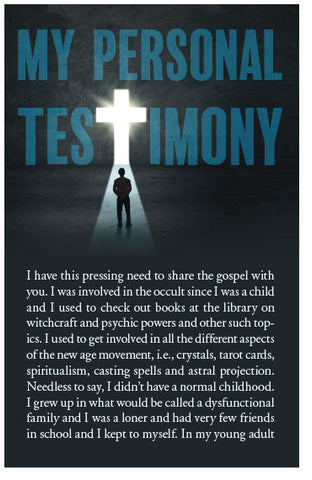Surviving Domestic Abuse (ESV)
Special-Order Folded Tract
 NOTE: This item is custom-printed to order (click for more details).
NOTE: This item is custom-printed to order (click for more details).
This tract is from our print-on-demand library, and is not kept in stock. Select the options below, and we will custom-print a batch just for you. Because this item is custom-printed, you can add your custom imprint to the back page at no extra cost.
- Estimated shipping date: Monday, February 2 (Click for more details)
- SKU:
- Discounts: Discount coupons do not apply to this item
- Format: Folded Tract
- Size: 3.5 inches x 5.5 inches
- Pages: 6
- Imprinting: Available with 5 lines of custom text
- Version: ESV
- Returns: Because this item is custom-printed to order, it cannot be returned.
Show all item details
The full text of this tract is shown below in the ESV version. (Do you want to print this tract in a different version than the one listed? Contact us and let us know what you're looking for—we may be able to create the alternate version for you at no charge.)
There are always at least two victims in domestic violence. There is the abuser and the abused. Domestic violence stems from a person’s desire to have power and control over another. Many people desire power and/or control, but unfortunately some manifest this desire by causing fear and pain in those they love.
How are spouses supposed to relate to one an- other? The Bible is very specific on how we should treat one another. Husbands should love and not be harsh to their wives (Colossians 3:19). They should be willing to sacrifice their own desires/needs (Ephesians 5:25). They should be understanding and even honor their wives as weaker vessels (1 Peter 3:7), not taking advantage of them because they are weaker. At the same time, wives should do their husbands good, and not harm, all the days of their lives (Proverbs 31:12). Wives should submit to their husbands (Colossians 3:18) and husbands to their wives (Ephesians 5:21).
What is considered abuse? Everyone has disagreements from time to time. However, calling names and degrading one another is abuse (Ephesians 4:29) and physical violence is never acceptable (Psalm 11:5).
What should I do if I am being abused? Pray for yourself and your spouse (Matthew 5:44). Second, you should prayerfully seek help from others (Matthew 18:15-17). If this does not work, you should separate yourself from the violence (Ephesians 4:31) until the abuser makes significant change. People often see separation as a step toward divorce. Divorce is not the answer to marital problems, anymore than the electric chair is an answer to cancer. Separation due to abuse is time for one partner to step out of harm’s way, while the other partner seeks help.
What do I do if I am an abuser? An abuser must realize that violence is unacceptable and desire to change. Any repentant abuser is a son or daughter of God. Pray for forgiveness. Protect your spouse— even from yourself, and seek help (Ephesians 5:28-29). All power and control belongs to God alone. Seek His face in all things.
Dear God,
Give me the strength to change the things in my life that I must change. Help all of my relationships to honor you. Amen
— Peggi J. Trusty
WHAT IF GOD HATED DOMESTIC ABUSE?
God disagrees with those that choose violence and cruelty as the answer to problems:
The LORD tests the righteous, but His soul hates the wicked and the one who loves violence. Psalm 11:5
Even how we talk to each other is important:
Let no corrupting talk come out of your mouths, but only such as is good for building up, as fits the occasion, that it may give grace to those who hear. Ephesians 4:29
God offers comfort in these situations:
From oppression and violence He redeems their life, and precious is their blood in His sight. Psalm 72:14
Also remember that the community of faith is established to be God’s hands and heart: Learn to do good; seek justice, correct oppression; bring justice to the fatherless, plead the widow’s cause. Isaiah 1:17
BE BLESSED!!













